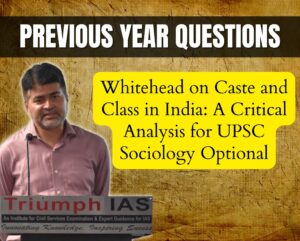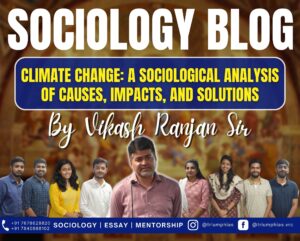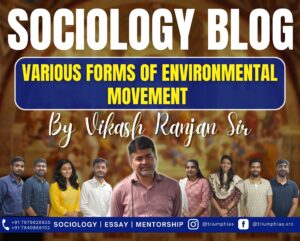Discuss Whitehead’s Contention that Caste has Potential to Displace Class and Colonial Contradiction.
(Paper: 2, Section- A, Year 2020, Unit 12: Caste System)

Discuss Whitehead’s contention that caste has potential to displace class and colonial contradiction.
(20 Marks)
| Introduction : Basic Idea About Caste System
Main Body : Caste Class Relations and Caste in Relation to Colonial Systems Introduced in India Conclusion: Relevance of Idea |
INTRODUCTION
According to WHITEHEAD, caste has existed in India even in pre-colonial period. However disciplinary rigidity in studying the caste starts with textually informed writings of colonial thinkers. They saw caste as timeless institution and most important defining feature of Indian society. It was seen as rigid and closed system all-encompassing system. Caste became the synecdoche of India, a single social institution that symbolized the character of the entire society
Main body
Caste Potential to Displace Caste
- Caste and class intersectionality exists because of historic access of higher caste to economic, social , symbolic and cultural capital. Yogerndra Singh has suggested that caste and class at upper levels and lower levels coincides. That means upper class majority is drawn from upper caste and lower caste is major proportion of lower class.
- Similarly A R Desai has highlighted that that caste has potential class character.
- The creation of organizations which are class based like All India Kisan Union etc. have strong caste dynamics interplay .
However these illustrations highlights how caste and class are intermingled but how caste identity reinforces the class divisions, but displacing the class system simply by caste is over exaggeration .
Class Caste Contradictions
- Middle Classes cannot be identified with any particular castes . It has people drawn from heterogeneous sections of caste, having only peculiar features based on achievement orientation of caste system.
- Political parties using all the castes equally for vote bank politics. hence having showing their only significant identity of ruling class beyond caste .
- According to Heera Singh , when Indian moves out of country they stop using their caste identities and nationalistic identity shapes their fictive kinship ties.
- The fact of brahmins being landlords represents secularisation of and deviation from the principle of religious hierarchy, highlighting how caste and class are already mingled in practice.
Hence at best that exists is caste class nexus but it is very difficult that caste will displace the class. This idea is simply can be seen as legacy of book view thinkers like Dumont who transformed real class and caste contradictions into oppositions in thought, which though looks like a critical understanding of the social relations which produce caste ideology, but is an apology for Brahminical Hinduism.
Caste and Colonial Contradictions
- Colonial rulers used caste as tool to divide the country and highlighted exploitative nature of caste to use it for their interest of getting support of so called ritually low caste groups. These contradictions even used today when caste seen as passport to politics.
- The colonial idea of separate electorate for lower caste today can be seen into transformed into demands for reservation by different caste groups.
Above illustrations highlights how colonial contradictions now being replaced by caste based ideologies. However apart from caste religious ideologies, regional imbalances, gendered discriminations and new proclamations of erstwhile invisible minorities like LGBTQ+ community shows it is not only caste but other social structures also there to either to reinforce or replace contradictions created by colonial rulers.
CONCLUSION
Whitehead’s analysis reveals the complexity of caste’s role in displacing class conflicts and colonial contradictions. While caste undoubtedly played a significant role in colonial narratives, Whitehead’s critique emphasizes the need for a more comprehensive understanding of the historical, cultural, and economic factors that contributed to India’s social landscape. Caste cannot be simplistically equated to a replacement for the multifaceted challenges posed by class struggles and colonial legacies.
Related Blogs …
 |
 |

To master these intricacies and fare well in the Sociology Optional Syllabus, aspiring sociologists might benefit from guidance by the Best Sociology Optional Teacher and participation in the Best Sociology Optional Coaching. These avenues provide comprehensive assistance, ensuring a solid understanding of sociology’s diverse methodologies and techniques.
META TAGS:
Whitehead, caste, class, colonialism, India, Yogerndra Singh, A R Desai, UPSC, Sociology Optional, All India Kisan Union, Brahminical Hinduism, reservation, LGBTQ+, Perspectives on the study of caste systems, GS Ghurye, M N Srinivas, Louis Dumont, Andre Beteille, Features of caste system, Untouchability forms and perspectives,
Why Vikash Ranjan’s Classes for Sociology?
Proper guidance and assistance are required to learn the skill of interlinking current happenings with the conventional topics. VIKASH RANJAN SIR at TRIUMPH IAS guides students according to the Recent Trends of UPSC, making him the Best Sociology Teacher for Sociology Optional UPSC.
At Triumph IAS, the Best Sociology Optional Coaching platform, we not only provide the best study material and applied classes for Sociology for IAS but also conduct regular assignments and class tests to assess candidates’ writing skills and understanding of the subject.
Choose The Best Sociology Optional Teacher for IAS Preparation?
At the beginning of the journey for Civil Services Examination preparation, many students face a pivotal decision – selecting their optional subject. Questions such as “which optional subject is the best?” and “which optional subject is the most scoring?” frequently come to mind. Choosing the right optional subject, like choosing the best sociology optional teacher, is a subjective yet vital step that requires a thoughtful decision based on facts. A misstep in this crucial decision can indeed prove disastrous.
Ever since the exam pattern was revamped in 2013, the UPSC has eliminated the need for a second optional subject. Now, candidates have to choose only one optional subject for the UPSC Mains, which has two papers of 250 marks each. One of the compelling choices for many has been the sociology optional. However, it’s strongly advised to decide on your optional subject for mains well ahead of time to get sufficient time to complete the syllabus. After all, most students score similarly in General Studies Papers; it’s the score in the optional subject & essay that contributes significantly to the final selection.
“A sound strategy does not rely solely on the popular
Opinion of toppers or famous YouTubers cum teachers.”
It requires understanding one’s ability, interest, and the relevance of the subject, not just for the exam but also for life in general. Hence, when selecting the best sociology teacher, one must consider the usefulness of sociology optional coaching in General Studies, Essay, and Personality Test.
The choice of the optional subject should be based on objective criteria, such as the nature, scope, and size of the syllabus, uniformity and stability in the question pattern, relevance of the syllabic content in daily life in society, and the availability of study material and guidance. For example, choosing the best sociology optional coaching can ensure access to top-quality study materials and experienced teachers. Always remember, the approach of the UPSC optional subject differs from your academic studies of subjects. Therefore, before settling for sociology optional, you need to analyze the syllabus, previous years’ pattern, subject requirements (be it ideal, visionary, numerical, conceptual theoretical), and your comfort level with the subject.
This decision marks a critical point in your UPSC – CSE journey, potentially determining your success in a career in IAS/Civil Services. Therefore, it’s crucial to choose wisely, whether it’s the optional subject or the best sociology optional teacher. Always base your decision on accurate facts, and never let your emotional biases guide your choices. After all, the search for the best sociology optional coaching is about finding the perfect fit for your unique academic needs and aspirations.
Follow us :
🔎 https://www.instagram.com/triumphias
🔎https://www.youtube.com/c/TriumphIAS
https://t.me/VikashRanjanSociology
Find More Blogs
|
Scope of the subject and comparison with other social sciences |
|||
|
|
|
|
Modernity and social changes in Europe |


4 comments